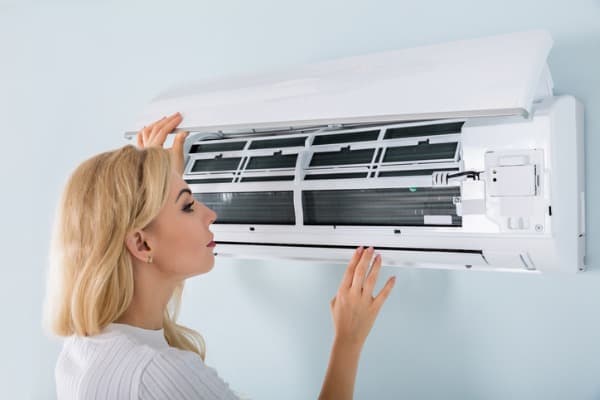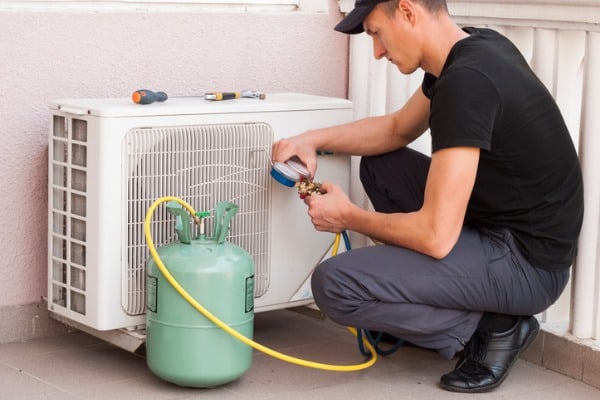
One of the worst things about summer is the intense heat that ruins our quality of life at home, but having a reliable AC unit can remedy that problem and keep us comfortable.
Even in winter, when it’s freezing outside, an air conditioner can be used as a heater if it’s equipped with a reverse valve mechanism.
Household items, appliances, and devices wear down over time, but it’s always a nuisance when your AC breaks down.
Read on to learn more about some of the notable reasons why an AC unit may stop working.
Vents Aren’t Open or Thermostat Isn’t set
Sometimes the reasons behind the lack of cold air are quite simple. People may not notice that the vents were closed accidentally or the thermostat was automatically reset.
Sometimes after a power outage, if the AC was on, the vents do not reopen automatically.
It can, sometimes, be hard to see if the vents open or closed, so always check that they are open so that the unit can keep blowing cold air.
The thermostat may automatically reset after an outage, too, or some AC models may have a faulty mechanism that resets the system.
Some of the newer digital thermostats, without a manual handle, may reset the airflow similar to a fan. Homeowners must always check the vents and thermostats before jumping to conclusions that their ACs are broken.
Lack of Servicing and Hardened Material
Another common reason behind the poor performance is the lack of regular servicing and hardened dust material or grease.
The fan coil, vents, and filters will gradually accumulate harmful particles that must be removed because leaving them too long will decrease the unit’s effectiveness.
Singapore is known for having high humidity and temperature levels, making a decent AC unit necessary.
The AC contractors at CoolBestAircon.com explain that chemical washing will thoroughly remove any hardened particles that water and soap can’t get rid of.
Consider researching safer chemicals needed to clear all of the hardened grease and dust properly, or hire AC servicing specialists to do it for you.
They have the experience and knowledge to clean the areas you can’t see or reach yourself, restoring your AC’s functionality and excellent performance.
The Unit’s Size Isn’t Optimal
Homeowners don’t realize that an AC unit’s size is crucial for excellent results. One of the reasons you may have temperature imbalances at home is that the AC’s size isn’t optimal enough for the room.
Some AC models aren’t designed to cover a large open area, especially if your home is designed to have multiple rooms with no doors.
Improper sizing will always make you feel that your home isn’t cold, making your quality of life inadequate and uncomfortable. Consider getting the right AC that fits your needs and home design.
Any small AC you may already have can be moved to another smaller room to ensure peak performance.
Getting advice from contractors is useful to understand the correct size for your home’s design and which ones to avoid.
Not Enough Gas

The lack of performance or the feeling that the device isn’t working can be because it ran out of gas or doesn’t have enough to function properly.
Homeowners must have their device checked to see if it needs a Freon gas top-up. Freon gas acts as the refrigerant element that makes your device function properly.
Without it, the air will feel as if it’s the normal room temperature or even hotter when the temperature is high outside.
Homeowners must call the servicing specialists to top up the unit once every year; some models can work for three years without a top-up.
It depends on the model type, but it’s smart to ask for help because your device might be leaking gas due to damages.
Getting top-ups every 4 to 6 months is not optimal, and there are damages, it must be fixed as soon as possible to prevent costly gas leaks.
Clogged Drains
The drain lines must be clear because clogged drains will ruin functionality and cause leaks. The excess moisture will build up and damage your wall, furniture, and device if it isn’t taken care of promptly.
The system is designed to remove humidity and moisture in the air, but without the proper drain line that eliminates moisture, the water will leak everywhere and ruin the vents.
Consider checking your AC pan to see if it’s full or not, and ensure that the drain line isn’t clogged.
Unclogging the drain will restore functionality and keep you comfortable at home since excess moisture blocks the air vents and motors from working efficiently.
Blown Fuse
When the temperature is extremely high, the AC system will be under intense pressure; this pressure can cause a fuse in the electrical system to blow or trip due to its system’s safety mechanism.
When the connections inside the breaker box blow from the temperature changes, replace the fuse with a new and stronger one. Consider giving your device a chance to stay off for a while to relieve some of the pressure.
Scorching heat outside will make the device struggle. However, setting it to automatically lower performance power when the room reaches an adequate temperature will decrease the chances of a blown or tripped fuse.
Whether you have an AC unit or a strong central air system, they may experience a few issues over time.
Nothing stays working perfectly for long, but taking some preventative measures as a precaution will delay and even prevent many breakdowns that can occur with prolonged use.
Being responsible and not overworking the AC can extend its lifespan, preventing any sudden problems or faulty mechanisms.
Learning about the possible reasons why your AC may stop working and the ways to fix it will help you ensure a happier and more comfortable home life.
Besides educating yourself on the common AC issues, you must also perform regular maintenance on your unit as recommended by the manufacturer to keep it running smoothly and effectively and avoid costly repair expenses down the line.
